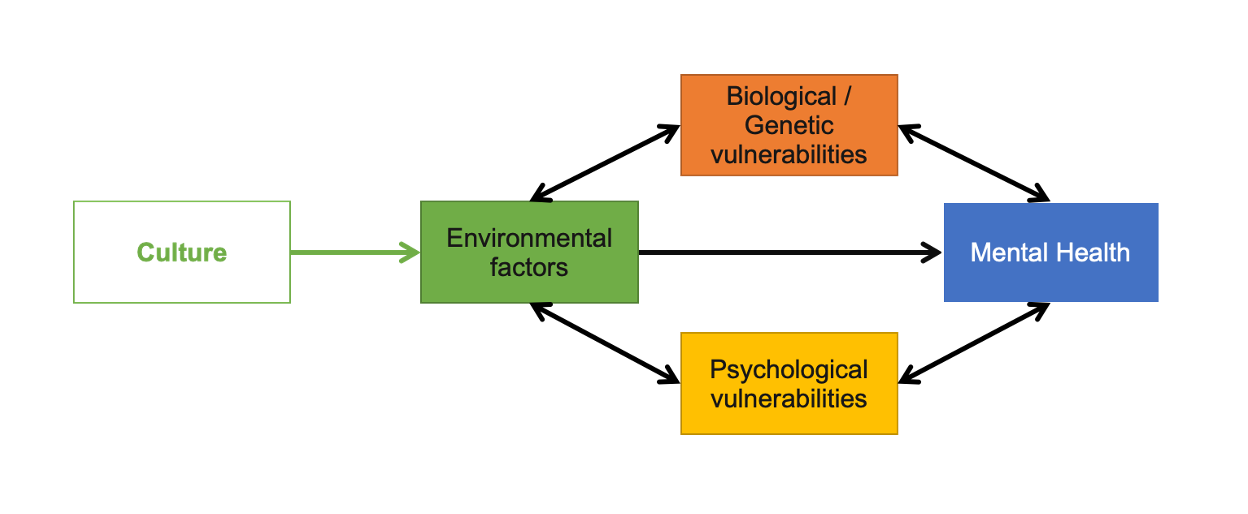Cultural influences are strongly associated with our mental health and well-being. Culture is part of our environment and essentially is a system of shared beliefs, customs, values, and behaviors among a social group. It is about who we are, how we define ourselves and how we make meaning of the world around us. It informs everything we do, thereby, influencing our environmental factors, which in turn are known to interact with our psychological and biological vulnerabilities leading to mental health pathology.

Just like other environmental factors, culture can also either promote or deteriorate our wellbeing. For example, stigmatizing beliefs within a social group can be detrimental for individuals with mental vulnerabilities, while the sense of community that the group provides can promote well-being by boosting a sense of belonging and psychological safety.
In an effort to develop a safe space for individuals going through mental and behavioral health challenges and aid their recovery, the concept of recovery culture came into being. Recovery culture aims to promote mental health and fitness among individuals globally across different existing social groups.
For the longest time, recovery from mental health disorders was not thought possible. But now we know that recovering from many mental illnesses is not only possible but with the right support, individuals can also lead fulfilling and successful lives. Therefore, it becomes important to aid that recovery in every way possible. And culture can play a major role!
Further, recovery looks different for different people. In a general context, recovery can refer to recuperating from daily stressors such as physical strain, work-related stress, financial stress, interpersonal stress with family/friends, mild symptoms of depression and anxiety, etc. and wanting to continue to thrive in various aspects of their lives. In a mental and behavioral health context, recovery for some individuals may mean finding a job, becoming financially independent, and being able to continue staying well while keeping the job, despite the limitations attached to their diagnosis. For others it may encompass finding a partner, getting married, and having a family. Recovery can also mean living their lives without symptoms or with less symptoms, or stop taking medications, or try not to get admitted into a hospital, or improve their social behavior. Meaning of recovery can be as varied as the meaning of fulfillment is in people’s lives.
“Recovery is remembering who you are and using your strengths to become all that you were meant to be”. – Lori Ashcraft, Founder of Resilience, Inc.
Even with different recovery outlook among people, the impact that a shared recovery-oriented culture can have on individuals’ ability to recover is well established through both research and empirical evidence.
What does recovery culture entail?
Recovery culture is all about supporting people in their recovery journey to overcome mental health challenges, physical health issues, or addiction challenges. It is all about fostering a supportive environment that supports individuals to build a meaningful life. The kind of support that people require varies not only from individual to individual, but also can be different for an individual at different phases of their recovery journey.
For some people, their recovery journey would become easier when they feel emotionally supported, for others being surrounded with hope and optimism is key, and despite setbacks along the way, for many, having a supportive group of people on their side to encourage them to keep going can be very helpful. All these are some of the features of a recovery-oriented culture.
Some of the other features of recovery culture include support to overcome social and self-stigma, support in building self-confidence, support in management of negative emotions and nurturing positive mindset, strengthening of the individual’s social support system, and support in improvement of personal coping strategies, among others.
Recovery culture is a way of life centered primarily on recovery. And since each person’s journey is unique, developing one’s personalized recovery plan that reflects on individual needs, preferences, and goals is important. It also involves a shared set of values and goals focused on creating a satisfying life that is filled with hope and resilience. This culture aims to help individuals become healthier, stronger, and more functional in a supportive community.
A deeper understanding of culture can better help us make sense of who we are, how we define ourselves and our actions, and our environment. This understanding makes the concept of recovery culture deeply personal, strengthening on personal accountability and taking pride in one’s progress.
